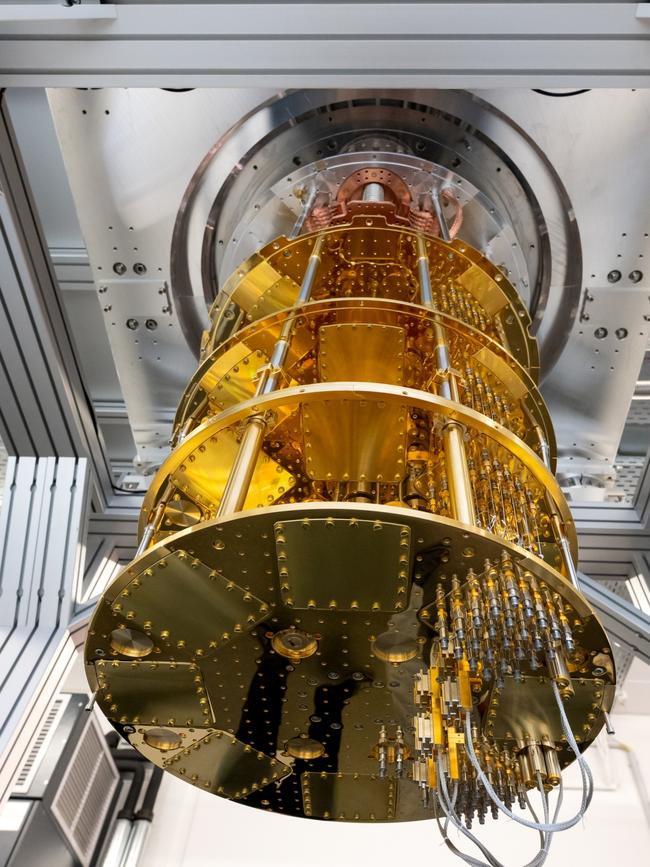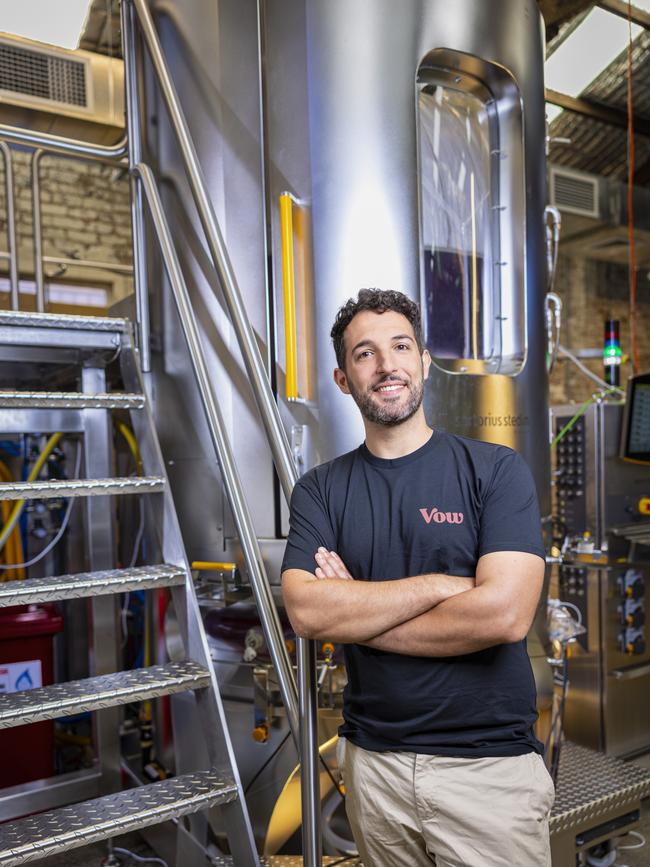The breakthrough technologies that will define the next decade
Some of the nation’s smartest entrepreneurs make their pitch for why cultured meat, AI-powered healthcare, quantum computing and more will determine Australia’s economic future.

Business
Don't miss out on the headlines from Business. Followed categories will be added to My News.
A number of breakthrough technologies are vying to be Australia’s defining innovation that will shape the coming decade. Some of the nation’s smartest entrepreneurs are building businesses around cultured meat, AI-powered healthcare and quantum computing, among others. On stage at this week’s National Tech Summit in Brisbane, four start-up entrepreneurs – and Australia’s chief scientist Dr Cathy Foley – weighed in and made their pitch as to why their chosen technology will have the largest impact on the economy and Australian society more broadly over the next 10 years. The pitches have been lightly edited for clarity and brevity.
AI - Aengus Tran, Harrison.ai co-founder and CEO
I was previously trained as a medical doctor here in Australia. And after I graduated a started a company with my brother to scale diagnosis and treatment with autonomous AI, and AI in healthcare is one of the most important breakthroughs over the next couple of years. Healthcare is fundamentally powered by the availability of healthcare professionals. They go to sleep at night, and they’ve been subject to massive disruptions, such as Covid. The health system is brittle because it’s powered by people. If we want to scale it’s very difficult because it takes anywhere between 12 to 14 years to train medical professionals. What that means is if our government put all of our resources today in training nothing but radiologists, we will realise the benefit of that more than a decade from now. Imagine I was pitching an idea of a technology that is patchy in availability, that only works during the day and not during nights and weekends and takes 12 years to scale, that’d be a ludicrous technology. But this is the technology that is looking after our health. Unfortunately we have better technology for Netflix than the technology that looks at our chest X-rays or CT brain during the most vulnerable moments in our lives and our loved ones.

Radiologists also working faster than ever, and spend around five minutes to look at an X-ray. I like fast food and like fast fashion but not fast radiology. I want it to be right. Sometimes people miss lung cancer for example, and this is not a problem that only exists in developing countries or third world countries. This exists here in Australia. And importantly, the scalability of the system means that there‘s better equality access to health care, so that someone who’s living in rural Australia, someone who’s living on a remote island, can get the medical service that they deserve. AI in healthcare is going to be one of most important things that collectively as a society we will build over the next decade.
Quantum - Vikram Sharma, QuintessenceLabs CEO
Quantum is going to be the defining technology of the next decade and beyond. Over the last 20 years or so, including some pioneering work by Dr. Cathy Foley, we are now on the cusp or in fact in the early stages of the second quantum revolution, wherein instead of leveraging effects that naturally occur, we are creating quantum effects that do not exist in nature. And as a result of that, we are going to see a whole host of new capabilities that come to the fore. So imagine in the medical field that you could detect cancer with a single cell. Imagine being able to detect minerals, undersea objects, underground tunnels that have been done with GPS to a much greater degree. These are some of the incredible benefits that you will see with this second quantum revolution and of course, quantum computing, which will dramatically shape our ability to do all kinds of problems that we just can’t solve today.

Whether we’re talking about advanced foods, whether we’re talking about AI, or looking at next generation optimisation across financial systems, quantum will underlie or be inside all these technologies and for these reasons, I think that quantum will be the defining technology of the next 20 years.
Future foods - George Peppou, Vow founder and CEO
Pretty much everywhere in the world as people get wealthier, they start to add more meat to their diet, which is why roughly in my lifetime, the total production of meat has doubled on this planet. That’s a kind of big problem. We cannot scale conventional agriculture, we can’t find efficiencies through conventional agriculture to meet this demand. So we have three choices ahead of us. One, a few billion people stop eating meat and animal products entirely. The second option is continued industrialisation of animal agriculture and more factory farms. And the third option is to work out some way to make protein that people who love eating meat choose because it’s more desirable than eating animals. And so that’s what myself and the team at Vow have been working on over the last four years. We make something called cultured meat. All cultured meat is is taking the cells that you’d find in animal meat and placing them in an environment outside of the animal where they grow and grow and grow. Feeding them the sugars, salts, amino acids, vitamins and minerals in the process, and then you can turn that into meat. We’re only growing this very specific cells that we want to consume and then turning those into a wide range of finished and packaged products.

You may be thinking, well, that sounds awfully science fiction. But just a couple of weeks ago, the US FDA and the US Department of Agriculture approved two companies that are making cultured chicken to sell on the market in the US. So you can go to San Francisco and try eating cultured chicken now, this is something which is just coming to market. But we don’t really want to just eat the same thing differently. What we’ve been working on at Vow is not just making the meats that we know today, but searching through nature to find the cells that grow the best, that are the tastiest and the most nutritious, and the probability of those coming from the animals that we already eat, that we’ve already domesticated and we already farm, is so statistically improbable. We really just eat three species out of a possible 10,000 on the planet. I believe by the end of the decade we’ll be buying protein in exactly the same way we buy breakfast cereals, buying it as a brand, not as a reflection of an animal that happens to exist today. And it’s going to change the way we think about food. It’s going to change the way that we think about purchasing. And it allows us to produce that proteins that growing demand using a tiny fraction of the land, the water, the energy and the ambition that is currently required to meet that growing demand.
Payments technology - Luke Latham, Airwallex Australia and New Zealand GM
In an era of the rapid globalisation of commerce, and with digital transformation impacting every industry, the question needs to be posed – has the financial infrastructure upon which global commerce functions kept up? I‘d say no. Frankly, I’m not entirely sure that the ancient Romans had all that much more difficulty moving money around than we currently do and for that reason, I think the breakthrough technology of the next decade is going to be in the financial and payments technology space. And that’s why I joined Airwallex. It was founded in 2015 in Melbourne, with the vision of being the global economic infrastructure to empower businesses to grow without borders. We built the most cost effective and efficient money movement network in the world, and a suite of financial products, software and API’s that enable businesses of all sizes to perform all manner of financial activities. So where’s the breakthrough? If legacy networks like Swift are a highway for money, think of Airwallex as a Hyperloop. We build our own infrastructure we’ve built for modern businesses from day one, we built so that business can be conducted anywhere from anywhere with one integrated, secure and compliant solution.
I think the one thing we can all be proud of is that Australians have always punched above their weight when it comes to tech breakthroughs. The reason that financial and payments technologies represent the breakthrough of the next decade is because global businesses are starting to learn what Australians have always known, that you need to be borderless from day one. For start-ups that have or aspire to have a multinational presence, if they’re to have a breakthrough over the next decade, chances are they’ll be building it with Airwallex.
Future Industries - Cathy Foley, Australia’s Chief Scientist
I’d like everyone to realise that we need to really think about our future industries, because at the moment we are very dependent on minerals and agriculture, and because of climate change they might not necessarily be a thing in the future, unless we can have things that can grow in 45 degrees on a regular basis and with no water.

When we come to the point of hopefully achieving zero emissions, we’re going to get to a point where all that investment will suddenly sit down and so we’ve got to have a whole lot of new technologies or new industries, and tech is where we have to be. This is really in many ways I think the lifeblood for future Australia.
More Coverage
Originally published as The breakthrough technologies that will define the next decade





